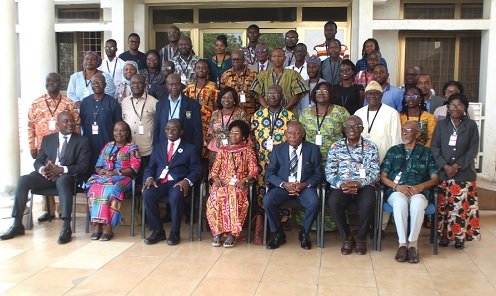
GTEC to introduce stricter academic programme approval mechanisms
The Ghana Tertiary Education Commission (GTEC) has expressed worry at the incurable desire for most tertiary institutions, especially the public ones, in introducing new academic programmes.
It said most of such programmes had no relevance to the current needs of the country, and were unfortunately copied wholesale from outside without local content.
The Director-General of GTEC, Prof. Ahmed Jinapor Abdulai, who vented his frustration in Accra last Thursday, said the commission was working to curb the practice by introducing stricter approval mechanisms for such requests.
He was speaking at the Ghana Academy of Arts and Sciences higher education project opening ceremony conference in Accra.
Conference
The international conference, which attracted people from academia and policy makers across the globe, was focused on, "Motivating higher education reforms in Ghana -- Towards equity and sustainability.
It was on the general theme: "Transforming universities for 21st Century Africa."
In 2022, GAAS launched a 24-month higher educational project.
It was to offer a credible platform for reflection and search for workable and sustainable solutions to some of the academic challenges of the higher education sector.
The project was designed to gather evidence, share information and provide a platform for building consensus and contribute to policy formulation on tertiary education in Ghana.
The project identified some challenges, including expansion and growth in student numbers, without corresponding expansion and growth in infrastructure as well as unplanned and inadequate investments in infrastructure development, ageing faculty and inadequate staff development as well as weak governance system.
Recruitment
He announced that the government had given the Ministry of Education the financial clearance to enable GTEC to recruit 1,341 staff to replace those who had exited.
Currently, the government's expenditure on post retirement contract appointments annually in public universities is more than GH¢127 million.
Prof Jinapor said the commission received and processed 231 applications for post-retirement contract from the universities for the 2024/2025 academic year.
Out of the number, 111 were senior lecturers, while 120 were in the professorial ranks.
"This is a clear indication of the sector's heavy reliance on ageing faculty and staff development challenges,” he said.
He said on the wheels of a request by the Vice Chancellors, GTEC had made a request to government for universities to be allowed to automatically replace exited staff under the supervision of the commission.
Prof Jinapor announced that the commission was working towards its first New Year School dubbed: "GTEC harmattan School; on capacity building for scholarly research writing and grantsmanship to be hosted at the University for Development Studies next year.
Local language
A professor of political science, University of Pretoria, South Africa, who spoke via zoom, Prof Toyin Falola, appealed to the regulatory agencies on the continent to allow both PhD and masters students to present their thesis in local languages.
He said it was time for Africa to collaborate to offer a joint PhD and masters programmes once the regulatory bodies gave the greenlight.
The professor expressed concerns about the fact that by 2030, the youth population on the continent was estimated to hit 830 million, most of who might not have a job and could destroy social cohesion.
